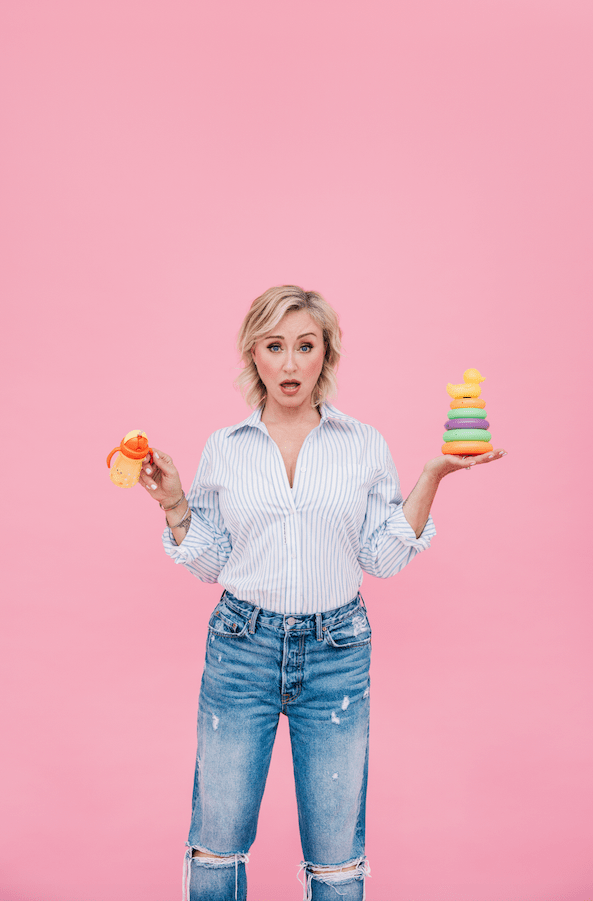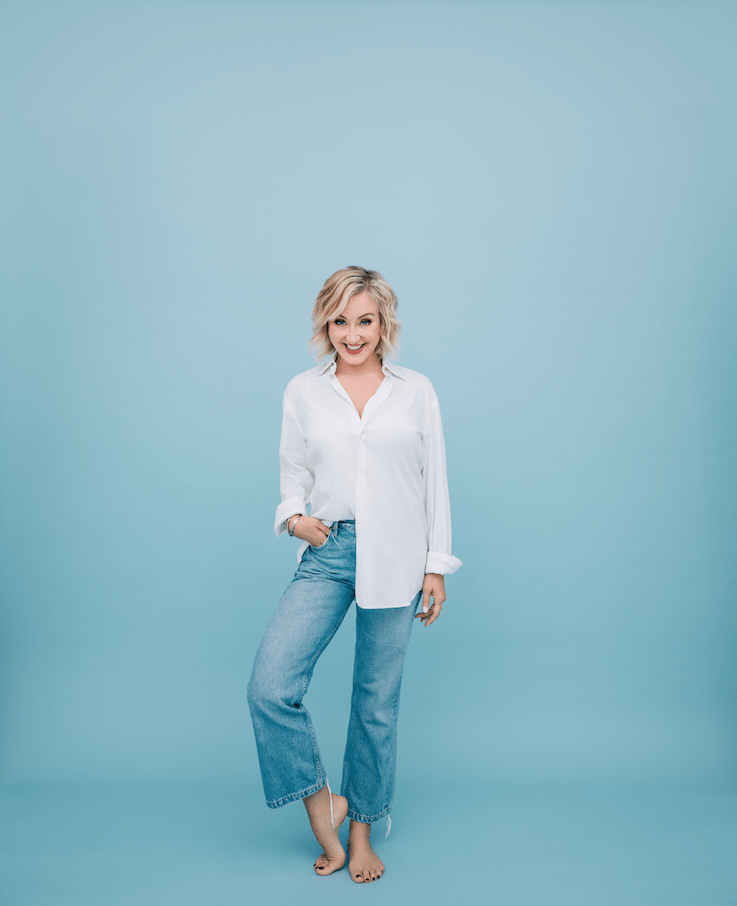Shantelle Bisson’s debut non-fiction book: Raising Your Kids Without Losing Your Cool will guide you through the anxieties and burdens of raising a family, all while helping you keep your cool. The book takes you from labour and delivery all the way through to the double digits. As the mother of three girls, Shantelle has seen it all, and her book touches on everything from social media to the perils of helicopter parenting and how to maintain your relationship with your partner through this whole crazy journey. It is one sale now through Indigo’s website and Amazon.
We spoke with Shantelle after self-isolation started. She is focusing on the positive. She hopes that we can learn that we need to stop more often respect ourselves and our need to have quiet and to slow-down. She is unfailingly enthusiastic about life at such a challenging time. She is also excited about her book release, even though, like many authors, she is unable to do book signings and tours. What makes her book unique is that it takes the fluff and the science out of parenting and it about her authentic advice. She is funny and insightful and we were thrilled to speak with her again.

You became a mother at a young age. What life lessons did you learn having a child when most people are still out partying?
The shallowest part is that you age slower. We are told [she and husband, Murdoch Mysteries’ Yannick Bisson] that we don’t look 50. That is because we were home and we weren’t drinking or partying. We were getting “sleep”. The immediate thing that it taught me was that I am idealistic and see things in a very black and white way. Growing up, you have these conversations with your girlfriends, like if I got pregnant and I wasn’t married…everyone would have varying opinions on what they would do. I was always the loudmouth going, “Oh, hell, no. I’m going to be a famous actor, there are no babies in my future. I’m not even going to get married. I absolutely would not keep the baby.” The lesson that I didn’t learn early was that you are not in charge of your destiny you can’t speak in absolutes. You don’t know what’s coming down the pipe in your life.
For me, the driving force behind saying that I’ll never have children is that I didn’t think that I would be any good at it. My mom was a good mother, but I was raised as a first generation Canadian on her side. My mom did the best she could as a single mother. She didn’t show a lot of affection because her parents fled the war [World War 2 Germany] on foot and they weren’t affectionate. They were very much about being raised by the hand. It seemed too hard to me, in the sense that there wasn’t a whole lot of reward. I was tough on my mom and I didn’t want that in my life. I didn’t want this huge likelihood of failure.
When motherhood was sprung on me, I ended up doing what I tend to do and decided to do it to the best of my ability. There are things that I wish that I had done differently. For example, Yannick is super affectionate and when the kids were little, he would get down on the floor and play with them. He was the one who would cuddle with them, craft with them, hold them. I wasn’t that way and if I could go back, I would be more affectionate and let that side of myself go. If I had had my kids in my 40’s, like some many people are doing, I would have been that mom. I was verbally affectionate and I was a good cheerleader, but not physically affectionate. I would have made that shift in my parenting.
As a mother of three girls, how did your parenting style change from the oldest to your youngest?
I’ve said this before, if you have more than one child, it’s completely different because they are completely different. The ground rules and standards are the same for everybody. How you implement rules and how you talk to a child or how you engage is going to be completely different because their ability to accept the way you communicate is going to be different.
You end up having different relationships with your kids because they show you who they are and they reveal their personalities and character. So, when I’m with one, I need to use this part of myself. When you are upset, you need to be spoken to this way. One needs to be held the other just needs to be allowed to talk. In being a parent, you’ve got to be flexible and you can’t be rigid, because inevitably, the child that doesn’t flourish under that one way of doing things is going to suffer. You have to be able to put yourself aside as a parent and do what’s best for your child and communicate in a way that makes that child feel supported.
How did you keep your cool as a Mom of 3?
The way to keep your cool with three different children is really understanding how they are uniquely their own person. It also means disciplining them in a way that is going to be impactful to them to spark change and reflection. You have to be willing to honour who they are as an individual and that will help you keep your cool. Since I am an idealistic person, I spent the bulk of my life living with expectations of how I would do things and putting those expectations on others. It’s something that I have been enlightened to in the last couple of years. I think it’s about letting go of expecting people to behave in a way that you would and allowing them to be who they are.
There are pluses and minuses to having your kids young and then older. We had them young and dragged them through everything because we didn’t know how to have a good relationship. They took the brunt of us having to work our stuff out and become a functioning couple. I hope that it taught them that it is not all roses and romantic dinners. You have to grind it out sometimes and you won’t talk to your partner for a couple of days because you are still mad. It shows them a realistic thing just because relationships have ugly periods, it doesn’t mean that they are over. It is unfortunate in the sense that we are now able to fight and have it over with in a few hours rather than a few weeks.
I would have been more patient and more empathic, but when you are young, you have energy to run them around to a thousand activities and still have joy. When you are older, it’s more daunting and draining. From both angles, you can stay cool. When you are older, it’s easier to have more patience emotionally, but when you are younger you have more energy so it’s easier to keep your cool when they are throwing a fit or won’t sleep. Parenting is a moving target and that’s the thing that a lot of parents need to understand. It’s never going to be the same.
Breast-feeding is a particular hot button amongst parents. What should women know about breast-feeding but may be afraid to ask or say out loud?
This is a great question, because it actually happened to me. I was 19 when we had our first baby. I had been a dancer my whole life, I was healthy, I was in great shape and young. Obviously, breast-feeding was going to be a breeze. Then, I couldn’t nurse my first baby. My milk came in, but for some reason, she had colic and stomach issues from the beginning. For the first ten days, I was literally nursing her every hour – hour and a half, to the point where my nipples were cracked open and bleeding. The pain of trying to nurse her, was worse than the pain from labour. I was getting infections and it was hell. I was devastated.
I had this vision of how it was going to all play out and it didn’t match that vision at all. The worst part was that Yannick’s father’s second wife had just had a baby and she was the Mother Theresa of nursing and she shamed me so hard. She accused me of giving up too early and not fighting through it. Finally, my mom got on the phone with her and told her to back off. She told her that she wasn’t seeing what was going on and that I had been doing everything that I could and the baby just will not nurse.
What women need to know, and a lot of people won’t tell them this, is that breast-feeding can be more painful than the actual delivery of the baby. I say this in my book, but women need to back off. One woman’s experience is not your experience and because it worked beautifully for you doesn’t mean that it is going to work beautifully for someone else. There are health benefits to breast feeding but by telling a woman that she is failing at it, you are making her feel that out of the gate that she is failing as a mother. It is one of the most obnoxious things that a woman can do to another woman because mothering is already the most difficult job that a woman is going to do. To add that burden of making a woman feel like she is failing is shameful.
Women need to step back and allow themselves to have their own experiences. We see this a lot, where everyone thinks that their opinion is the only opinion and it needs to be heard. Quite frankly, it doesn’t and if you are not a friend, and you are a keyboard warrior, your opinions matter even less. None of us are in each other’s shoes and you don’t know what someone else is going through. Maybe it was their dream to do it and it’s not working out and that’s their private struggle.

How do you think social media has changed people’s parenting styles?
I have a hate/love relationship with social media. If I didn’t need to have it, I wouldn’t. I’ve been told to follow all of these mommy bloggers to help with my brand and to align myself with current moms. It’s interesting to me, as an older mom, that people give birth and the very next thing that they do is make themselves a mom blogger. It’s like we need to know everything about their mom journey. It’s cute when the kids are little and will dance in front of the camera and you can get 10,000 likes.
I think what’s it’s done is it removed the intimacy between parent and child and created this relationship where the child is being exposed to the habit of acceptance and likability. When you put your child out there as part of your mom brand, you set them up for the expectation that they are cute, popular, funny and that people are going to like them. The reality is the world doesn’t work that way. Not everyone is going to like your kid. When they go to school, they may not gel with other kid’s personalities.
In one way, it does a disservice to the mother/child relationship at home and puts pressure on young moms who see all these mom bloggers and instagrammers have the perfect house, do perfect crafts with their perfectly dressed children and their perfect husband. It makes them think, how come my kid won’t sleep, won’t eat, yet these other moms seem to have it all handled? It’s sending out the message that I am awesome, that I’m doing great because I can breast feed, and have a perfect home and perfect children and you are just not doing it right. You are failing at your mom role. It’s a huge disservice.
What parents need to understand is that you don’t own your child. They are not your property. A lot of parents on social media seem to want the likes and to be gifted things. Can we all just stop and just honour that our families are our own little nucleus? These things are all things that kids have done for more than a millennium. They talk, they walk, they laugh and cry. In my book, I talk about how it disgusts me when people post pictures of their kids in vulnerable situations, like when their kid just got their wisdom teeth out. That’s there forever and your ten-year-old might not know that you’ve posted that but when they are 20, they will be like really, that was about me, not about you. It will create a backlash and what it’s done is it’s allowed every parent to be a stage parent. Everybody is putting on a show, but for who? The ones that I enjoy are the people who are being honest. Their makeup isn’t done and they are telling it like it is. Social media has removed a lot of the authenticity from being human.
You touch on helicopter parenting in your book. How do you think parenting changed from when you were raised to when you became a parent? How do you think it’s changed from when you became a parent to now?
As mentioned, I’m first generation Canadian. My mom was raised autocratically. You did what you were told, or you got spanked. My mom went one step away from that, but I was still chased around with a wooden spoon. The expectation was that you don’t mouth off and you do what I say because I said so. I didn’t want to parent like that if and when I had kids. We’ll have some dialogue and my kids will be able to express themselves and give their side of the story. When we parented our kids, we still had house rules and if they didn’t follow them there was a consequence. They would get two spanks on their bum and nobody ever got chased through the house. There was no rage or getting to the boiling point. We eliminated that part of the parenting scenario of just lashing out by hitting your max and totally losing your cool. I thought we had a good balance, but looking back, and conversing with all of the girls now that they are all between 23-31, we wouldn’t have done the spanking. We were part of a church group that believed that spanking was part of parenting. I would have changed that.
I think because of the autocratic way many people used to be raised, you now see parenting where nobody is wrong, everybody’s feelings are valid and everybody can do it when they feel it’s time. There is a lot of leniency and we don’t say no in this house. Everybody always wins, and the issue with that and what we are seeing happen is that a lot of these kids grow up, and learn everybody doesn’t always win. When you apply for a job, not everybody can get it. Not everybody will get a promotion and you can’t split it up and share it. We are setting kids up for failure.
When our oldest was growing up, people were still parenting with consequences. By the time our youngest was going through school, we noticed a huge shift, so she ended up having more issues going through school than our oldest girls, because back then, a lot of kids were raised with the same expectations. By the time she got to school there was a change in the rules. Parents automatically sided with their child because they were perfect so your child must have started it. There was a shifting of blame. What happens in those scenarios is that kids don’t get a realistic understanding so when they go on to university and their parents aren’t there to do their assignments or call your teacher to get you that A+ and you are just a number in a lecture hall with three thousand kids, some see that they aren’t capable of doing it. These kids are lost.
I’m not a psychiatrist, but if I were to guess a reason why there is a spike in depression is, they don’t have coping skills because they were never allowed to fail. They were not taught that failure is a part of life and is a normal experience. They can’t cope with schedules, deadlines and not being special. With helicopter and lawnmower parenting, the path is cleared for them to succeed and it instills false confidence. It’s the greatest disservice to not let your kids work things out on their own and I’m proud that we gave that to our girls. The balance was there. We supported them as they needed it emotionally, but we made them problem solve. They had to find the solutions on their own. We would guide them and give them advice but we wouldn’t solve the problems for them.
I think that the bottom line is that most parents do what they are doing because they love their child so much. The older a person is when they start to parent, the harder it was for them to have that child. Most parents are not coming from arrogance. It’s coming from a place of love and gratitude and wanting their child to have the best life experience that they can. The mistake made is that holding their hand through every part of their journey is not the best way to love them. The best way is to catch them when they fall, not keep them from falling.
Part of your book is about how to KEEP HAVING SEX with your partner. How can busy moms make the time or the effort when they just don’t feel desirable?
When you are younger, let’s face it, you are just horny. Your hormones are just designed that way so it’s easier to keep having sex when you are young. Plus, you have more energy, so you can squeeze it in at midnight. It is harder to keep intimacy going when you are a parent. Scheduling sex would never work for me, but that’s not a judgment, it’s just how it works for some people and a lot are doing that. The advice that I would give to couples that are struggling to have the time and energy for intimacy is to remember that intimacy starts from the moment that you wake up. It’s easier to be sexual and to want to have sex if each partner decides each and every day to be in love. I think it’s the same thing with sex. You aren’t always going to feel like having sex, but you have to start wanting to have sex and what does that look like to you. As a couple, when you find yourself in a place where sex isn’t happening organically, like everything in life, you have to sit down with your partner and communicate. It’s figuring out how to rectify it.
It starts with open communication about what your sexual needs are, how much sex you want and need and then you go from there. I think a lot of couples don’t like to talk about sex. They don’t want to admit how important it is in their relationship. At the beginning of most relationships, it’s a non-conversation because it’s easy and natural. As the relationship goes on, couples are afraid they are going to hurt each other’s feelings if they admit that the sex isn’t good anymore or it’s not enough. It’s a huge mistake to not be clear and open about your sexual desires. That’s where you may need to get a therapist involved. Not having intimacy is the greatest way to break down a relationship. Sex is a way to make us feel close and tied to one another. We’ve [Yannick and she] been together for 32 years and have had a lot of dry time and we have been able to have those conversations to make sure that we can keep the relationship healthy. Let’s be honest, sex is one of the best parts of life when you are doing it right.
Finally, if moms can only remember one lesson from your book, what would you like that to be?
Take it easy on yourself. You are doing great. You are awesome. Put your phone down and stop comparing yourself. Your journey is your journey and your kid are different than anyone else’s kid.






